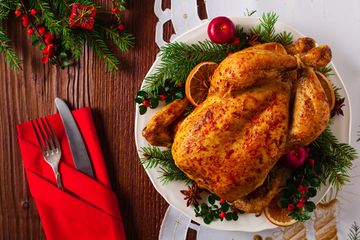
There’s a popular meme doing the rounds again this year. It goes something like this:
“How to tell it’s time to start thinking about Christmas: ask yourself if it’s December yet. If the answer is “no”, it’s not time yet.”
At the risk of provoking the ire of die-hard Decemberists, now may be a good time to begin planning your cold-sore free Christmas. This is because, as we all know, as the cold and windchill factors increase over the Northern Hemisphere during the autumn and winter months approaching Christmas, so too does the cold sore risk.
But does this mean that we should just give in to the inevitability of winter outbreaks and begin to prepare by asking Santa for a stocking stuffed full of cold sore cream?
While you can't go wrong with a decent supply of clinically proven cold sore cream, we should also ask ourselves what we can do to reduce the possibility of an outbreak because, when we begin to look at our options, there actually is quite a lot we can do.
For a start, we can consider that the Christmas period is one in which we have a tendency to consume very particular foodstuffs, some of which are surprisingly arginine-rich, an amino acid which the herpes virus requires for replication:
Cold sores replicating by the fire: It may be a horrible image we have just conjured here, but it is useful to know that chestnuts are very high in arginine which means they should be avoided by conscientious cold sore suffers – sorry!
Pumpkin seeds: Autumn is pumpkin season, and lots of pumpkins mean even more pumpkin seeds, and pumpkin seeds mean arginine, and arginine means cold sores. At the time of Halloween and Christmas, be sure to go easy on the pumpkin seeds unless you want to go heavy on the cold sore cream.
Chocolate: Chocolate seems to be on the menu for just about every celebration in the modern world. The problem is that chocolate is full or arginine. The odd chocolate is mostly fine, but don’t gorge yourself on chocolate liqueurs, reindeers or Santas this year if you want to reduce the chances of an outbreak.
Nuts: Nuts are a staple snack during the festive season, but before you finish off that bowl of mixed nuts, remember they are incredibly arginine-rich.
Turkey: Turkey is the main event of the Christmas meal. We’re not saying you should avoid it – after all the alternative is likely to be an even less helpful nut roast – but simply that you should not go overboard. Turkey on Christmas day followed by turkey sandwiches every day until the New Year is not going to do your hopes of staying cold sore clear any favours!
But Balance is Best
Remember it’s not just about avoiding arginine, it is also about having more lysine in your diet than arginine. This means that if you eat plenty of lysine – and perhaps take a supplement too – over the Christmas period, you can consume arginine-heavy foods with less concern. And although we don’t recommend asking Santa for only cold sore cream this Christmas, you could do worse than asking for a tube of Herstat. Our suspicion is that Santa would have no trouble sourcing it. It is likely that he has something to protect his lips on those long winter journeys through the winter sky in his sleigh, and what would be better for those purposes than our propolis stick!












